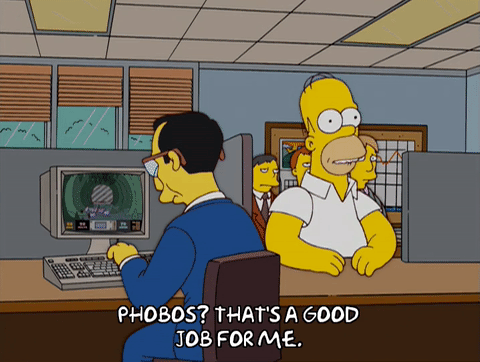Anyone in college admissions will wax poetic about summer jobs. With a summer job, high school students beef up their résumés, use their brains over the summers, and acquire new skills. Students who keep with their summer jobs during the school year are even more impressive. They prove they can balance school and other commitments.
Need more convincing? You’ll also make some money.
Finding a summer job isn’t always easy, especially in a shaky economy, but you may have some luck with a smart job search. Use these pointers, and soon enough, you should be able to get that summer cash flow started.
1. Reach out to your parents and your friends’ parents.

Bridesmaids / Giphy
Your networks can help you find a job, and the adults in your life might be more inclined to hire you because they already know and trust you. A parent’s or friend’s office might be looking for someone to help with a short-term project; voilà, you’ve found a summer job.
I got lucky with my first job. My mom worked at a dentist’s office, and the part-time receptionist had too much on her plate. On Tuesdays and Thursdays after school, I filed papers, validated parking, answered phones, and made confirmation calls for the next day’s appointments. I made over $6 an hour, which was more than minimum wage way back in 2006, so I thought it was a pretty good gig. The truth is, I never would have gotten the job if I hadn’t had the family connection.
2. Ask your friends if their bosses are hiring.
You’ve probably heard the phrase: “It’s not about what you know; it’s about who you know.” Employment often works this way, especially for young students who don’t have robust résumés or reference lists yet. Don’t be ashamed to ask your friends if their jobs are hiring. Not only can they help you get the job, but they can give you an honest review of the workplace before you sign up.
One of my high school classmates scored a job in concessions at the baseball stadium. Shortly after, he helped another classmate get hired, who helped another kid get hired, and so on. Suddenly, there were so many students who sold peanuts that it seemed more like an extracurricular activity than a job.
3. Go old-school and fill out applications in person.
Is there a street, mall, or area in your town that is full of shops and restaurants? Consider going on an old-fashioned job crawl (like a pub crawl, but instead of drinking a beer at each stop, ask if it’s hiring).

The Simpsons / Giphy
Filling out an application in person has its perks. It’s less formal than an interview, but it still gives you a great opportunity to make a first impression with potential coworkers and bosses. Plus, the more applications you fill out, the more likely you are to hear back from multiple companies. You may be able to choose between the paint-your-own pottery place and the J. Crew.
If you’re going on a job crawl, don’t forget to bring copies of your résumé with you. Most applications don’t require one, but turning it in anyway could help you stand out from the pack. Most applications will require you to put down two or three references, so make sure you have the names and numbers of teachers, former bosses, or family friends on hand. And always give them a heads up that you’re listing them as references.
4. Respond to the summer job market demand.
If you’re still at a loss, think about companies that need extra help in the summer:
- Landscaping companies
- Movie theaters
- Pools
- Summer camps
- Outdoor stadiums
These employers are busiest during the summer months, which is great for you because these are the months that coincide with your summer break. These jobs are particularly good for students who aren’t sure that they want to work during the school year or for students who are heading to college at the end of the summer.
One summer during college, I found myself working as a residential window washer. The company was busiest during the warm weather when people were spring cleaning or preparing for parties. It wasn’t glamorous work—most of it was outdoors in high heat—but it paid well and it ended “cleanly,” right before I headed back to college.
5. Work for yourself.
Now that you’re not an adorable first grader, you can’t exactly make a living by running a lemonade stand. You can, however, babysit the cute kids who do (or mow their parents’ grass). When you babysit or mow grass, you tend to have flexible hours, and much of your client base is developed through word of mouth. These jobs are best for students who market themselves well and have connections in their communities. Babysitters are especially in demand if they have completed babysitting training through the Red Cross or another program.

Giphy
Although I did work as a babysitter off and on in high school, I had more success as a dog walker and pet sitter. When neighbors and friends headed out of town for summer vacation, they often needed someone to take care of their pets. That’s where I came in.
Babysitting, mowing grass, and taking care of animals isn’t easy work. These jobs are, however, more difficult to put on your résumé, but it can be done. If you have one client, you may decide to consider it your employer (the Greenwald Household, for example). If you have multiple clients, you may decide to name your services (Independent Lawn Care Services, for example). Underneath, when you list your job duties as bullet points, you can specify how many clients you had (e.g., Provided pet sitting services to five clients).
6. Be wary of job offers you find on the internet.

Victorious / Giphy
Many people are job hunting on the internet these days. I found my first post-college job on an online database. With that being said, while I was looking, I did find a lot of spam on Craigslist. Before you agree to a job online, be sure you visit the locale in person. Never give out your bank account information for “direct deposit” before you can verify that the employer is legitimate.
Some students stress out when they’re looking for high school jobs because they are looking for positions that will impress colleges. In the end, though, it doesn’t much matter to colleges which position you held in high school; they’ll be ecstatic to see you held one at all. So, take a job that you’ll enjoy. Look for something that you’ll learn from. Bonus points if it offers sweet employee discounts.
-
Why You Should Participate in Extracurricular Activities during High School
-
What Makes College So Different from High School?
-
What We Wish We’d Known about Graduating High School
-
Why It’s Important to Prepare for College in High School
-
Preparing for AP and IB Exams: Advice from Student Caffé
-
Things I Wish I Knew before I Left for College
-
Why Do Standardized Tests Matter?
-
Preparing for Standardized Tests
-
Extreme Makeover: High School Résumé Edition
-
Finishing High School Strong: What to Do after You’ve Been Accepted
-
Community College: The Unsung Hero of Higher Education
-
Using Your Winter Break Wisely in High School

